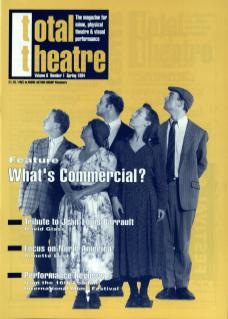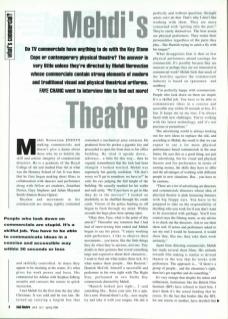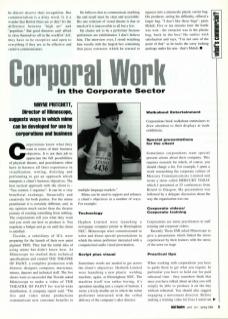Mehdi Norowzian enjoys making commercials and doesn't give a damn about those who tries to belittle the skill and artistic integrity of commercials directors. He is a graduate of the Royal College of Art and studied Fine Art at what was the Hornsey School of Art. It was there that he first began making short films in collaboration with dancers and performers along with fellow art students, Jonathan Davies, Gary Stephens and Julian Maynard Smith (Station House Opera).
Rhythm and movement in his commercials are strong, tightly contained and skilfully controlled. At times they appear to be straining at the seams. It's what gives his work power and force. His commercial for Adidas with Stefan Edberg assaults and caresses the senses in quick succession.
I met Mehdi for the first time the day after Christmas. It was cold and he was late. He turned up carrying a largish box that contained a mechanical juice extractor. He produced from his pocket a gigantic key and proceeded to open the front door to his office building. He tried it upside down... sideways... a little bit this way... then he vaguely remembered that the lock had been changed. I looked worried. Mehdi was supremely but quietly confident. ‘Oh don't worry we'll get in somehow, we have to!’ He said, his eye judging the full height of the building. He casually reached for his wallet and said airily, ‘We'll just have to get in like they do in the movies!’ I looked on doubtfully as he shuffled through his credit cards. Visions of the police hauling us off began to flash through my mind. Within seconds the huge glass door sprung open.
“People who look down on commercials are stupid. It's a skilful job. You have to be able to communicate ideas in a concise and accessible way within 30 seconds or less.”
‘Okay then, Faye, what is the point of this article?’ Thereafter any intention that I had had of interviewing him ended and Mehdi began to say his piece. ‘I enjoy working with performers. I like to observe their movements... you know, like the little things they do when they're anxious, nervous. Tiny details in their gestures that reveal something large and expressive about their characters... I want to find out what makes them tick. It's what makes them people... like Hamish.’ Hamish McColl, himself a successful performer in his own right with The Right Size, performed in two Stella Dry commercials directed by Mehdi.
‘Hamish looked just right... I said something like... Raise your arm. Do a spin. Do a turn. Pretend there's a fly... now maybe try and take it with your tongue. He did it perfectly and without question. Straight actors can't do that. That's why I don't like working with them. They are more concerned with "getting into the part". They're rarely themselves. The best actors are physical performers. They retain their personalities regardless of the parts they play... like Hamish trying to catch a fly with his tongue!’
What disappoints him is that so few physical performers attend castings for commercials. It's possibly because they are unaware or perhaps they are not interested in commercial work? Mehdi feels that much of the hostility against the commercials industry is based on ignorance and snobbery.
‘I'm perfectly happy with commercials. People who look down on them are stupid. It's a skilful job. You have to be able to communicate ideas in a concise and accessible way within 30 seconds or less. It's fun. It keeps me on my toes. I'm always faced with new challenges. You're working with the latest technology, and it's not precious or pretentious.’
The advertising world is always looking out for new ideas to replace the old, and according to Mehdi, the result is that we can expect to see a lot more physical performance based commercials in the near future. He sees this as a good thing, not just for advertising, but for visual and physical theatre and for performers in terms of earning money, the skills they have to offer, and the advantages of working with different people in new situations. But... you have to be cautious.
‘There are a lot of advertising art directors and commercials directors whose idea of physical theatre is pink bouncing bunnies with big floppy ears. You have to be prepared to take on the responsibility of deciding who you work for if you don't want to be associated with garbage. You'll lose control once the filming starts, so my advice is to check out the directors. Ask to see their show reel. If actors and performers asked to see my reel I would be honoured, it would show that, like me, they take their work seriously.’
Apart from directing commercials, Mehdi has made several short films. His attitude towards filmmaking is similar to devised theatre in the way that he works with performers. The approach is... ‘if there's a group of people... and the chemistry's right, then let's get together and do something’.
It's very strange that despite his talent and enthusiasm, institutions like the British Film Institute (BFI) have refused to fund him. I don't think it's the actual funding that he craves. It's the fact that bodies like the BFI, for one reason or another, have decided that he doesn't deserve their recognition. But commercialism is a dirty word. Is it a wonder that British films are so dire? It's the difference between ‘high art’ and ‘populism’. But good directors can't afford to close themselves off in the world of ‘Art’ – they have to be receptive and open to everything if they are to be effective and creative communicators.
He believes that to communicate anything the end result must be clear and accessible. His one criticism of visual theatre is that so much of it is inaccessible to all but a few.
He claims not to be a performer because performers are exhibitionist. I don't believe him. The interview over, I stood watching him wrestle with the largish box containing that juice extractor which he started to squeeze into a minuscule plastic carrier bag. His producer, seeing his difficulty, offered a larger bag. ‘I don't like those bags,’ pants Mehdi. Five or ten minutes later the battle was won, the extractor was in the plastic bag, back in the box! He smiles with satisfaction and says, ‘I'm not sure of the point of that’ as he tucks the sorry looking package under his arm – that's Mehdi.


